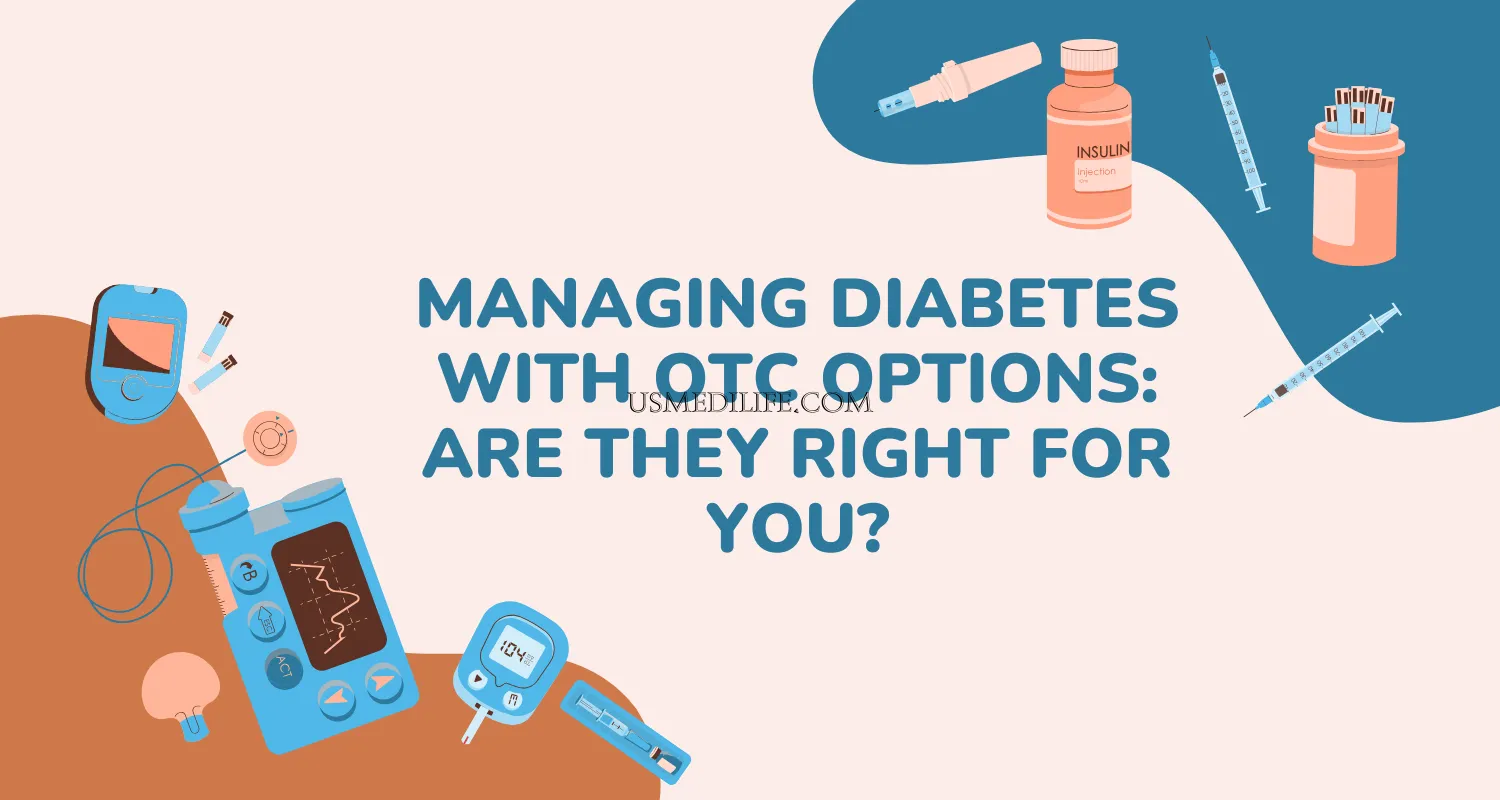
Dr. Ashwini
07-07-2025
Managing Diabetes with OTC Options: Are They Right for You?
Living with diabetes requires careful management to keep blood sugar levels in check and maintain overall health. While prescription medications like metformin or insulin are often central to treatment, some people explore over-the-counter (OTC) options to complement their diabetes care plan. But are OTC options safe and effective for managing diabetes? This blog breaks down what you need to know about OTC supplements and remedies, their potential benefits, risks, and whether they’re right for you.
Understanding OTC Options for Diabetes
OTC options for diabetes typically include dietary supplements, herbal remedies, and certain monitoring tools like continuous glucose monitors (CG Grown). These products are available without a prescription and are often marketed to support blood sugar control or overall health. Common examples include cinnamon, chromium, alpha-lipoic acid, and fenugreek. Recently, the FDA approved the first OTC continuous glucose monitor for people with type 2 diabetes who don’t use insulin, offering a new way to track blood sugar levels without a prescription.
It’s important to understand that OTC options are not replacements for prescription diabetes medications. They may provide mild support for blood sugar management, but their effects are often limited compared to medications like metformin or insulin. Always consult your doctor before adding OTC products to your routine.
Potential Benefits of OTC Options
Some OTC supplements and tools may offer benefits for people with diabetes, but the evidence is mixed:
-
Cinnamon: Some studies suggest cinnamon may slightly improve blood sugar control by enhancing insulin sensitivity. However, the effects are minimal at typical doses, and results vary.
-
Chromium: This mineral may help improve insulin function and glucose metabolism, particularly in people with chromium deficiency. However, most people don’t need extra chromium, and high doses can be harmful.
-
Alpha-Lipoic Acid: Known for its antioxidant properties, alpha-lipoic acid may help reduce oxidative stress and improve insulin sensitivity. Research is promising but not conclusive.
-
Fenugreek: This herb has shown potential in lowering blood sugar by slowing carbohydrate absorption, but more studies are needed to confirm its effectiveness.
-
Continuous Glucose Monitors (CGMs): The FDA-approved OTC CGM is a game-changer for people with type 2 diabetes who don’t use insulin. It allows real-time blood sugar tracking via a wearable sensor and smartphone app, helping you make informed decisions about diet, exercise, and medication.
These options may support diabetes management when used alongside prescribed treatments, lifestyle changes, and medical guidance. For example, a CGM can help you understand how food and activity affect your blood sugar, while supplements like cinnamon or fenugreek might offer mild benefits for some people.

Risks and Limitations
While OTC options may seem appealing, they come with risks and limitations:
-
Limited Evidence: Most dietary supplements lack robust clinical evidence to prove they significantly lower blood sugar. Unlike prescription medications, their effects are often mild and inconsistent.
-
Potential Interactions: Some supplements, like St. John’s Wort, can interact with diabetes medications, reducing their effectiveness or causing side effects. For example, St. John’s Wort may affect how your body processes certain drugs.
-
Safety Concerns: The FDA doesn’t regulate dietary supplements as strictly as medications, so quality and purity can vary. Choose products with third-party certifications (e.g., USP or ConsumerLab) to ensure they contain what’s on the label. Taking too much of certain supplements, like chromium, can cause digestive issues or, in rare cases, kidney or liver damage.
-
Impact on Blood Sugar: Some OTC products, like decongestants (e.g., pseudoephedrine) or cough syrups with sugar or alcohol, can raise blood sugar levels, making diabetes harder to manage. Always read labels carefully.
-
Not a Substitute: OTC supplements cannot replace prescription medications, which are designed to effectively control blood sugar. Relying solely on OTC options could lead to poorly managed diabetes and complications like eye, kidney, or heart issues.
Who Might Benefit from OTC Options?
OTC options may be worth considering if:
-
You Have Mild Type 2 Diabetes: People with early-stage type 2 diabetes or prediabetes may find OTC supplements or CGMs helpful as part of a broader management plan involving diet and exercise.
-
You Have Nutrient Deficiencies: Your doctor may recommend supplements like vitamin B12 or vitamin D if lab tests show deficiencies, which are common in people with diabetes.
-
You Want to Track Blood Sugar Closely: An OTC CGM can be a valuable tool for monitoring how lifestyle choices affect your blood sugar, especially if you don’t use insulin. It’s not suitable for severe hypoglycemia or insulin-dependent diabetes, though.
However, OTC options are not a one-size-fits-all solution. They’re most effective when used under medical supervision as part of a comprehensive diabetes care plan.
How to Use OTC Options Safely
If you’re thinking about trying OTC options for diabetes, follow these steps to stay safe:
-
Talk to Your Doctor: Before starting any supplement or OTC CGM, discuss it with your healthcare provider to avoid interactions with your medications and ensure it’s appropriate for your condition.
-
Choose Quality Products: Look for supplements with third-party testing seals (e.g., USP, ConsumerLab) to ensure purity and accurate dosing.
-
Monitor Blood Sugar: Track your blood sugar levels regularly when starting an OTC product to see how it affects you. Contact your doctor if your levels are consistently outside your target range (typically 80-130 mg/dL before meals or below 180 mg/dL two hours after).
-
Read Labels Carefully: Avoid OTC products with ingredients like sugar, alcohol, or caffeine, which can raise blood sugar or blood pressure. For example, some cough syrups contain up to 20 grams of carbohydrates per dose.
-
Combine with Lifestyle Changes: OTC options work best alongside healthy eating, regular exercise (e.g., 30 minutes of aerobic activity five days a week), and stress management. The diabetes plate method, which balances meals with vegetables, lean protein, and whole grains, can also help.
Are OTC Options Right for You?
Whether OTC options are right for you depends on your specific health needs, diabetes type, and treatment plan. Here are some factors to consider:
-
Type of Diabetes: OTC options are primarily relevant for type 2 diabetes or prediabetes. People with type 1 diabetes or insulin-dependent type 2 diabetes typically need prescription medications like insulin, and OTC supplements are not a substitute.
-
Health Conditions: If you have kidney, liver, or heart issues, some supplements or OTC medications (e.g., NSAIDs) could pose risks. For example, NSAIDs can harm kidney function in people with diabetes.
-
Current Treatment: If your blood sugar is well-controlled with prescription medications, diet, and exercise, OTC supplements may not add significant benefits. However, an OTC CGM could provide useful data to fine-tune your plan.
-
Budget: OTC supplements and CGMs can be costly, and insurance may not cover them. Compare prices and check for generic or store-brand options to save money.
Ultimately, OTC options should never replace prescribed treatments or lifestyle changes. They’re best used as a complement, under medical guidance, to support your diabetes management.

Alternatives to OTC Options
Instead of relying solely on OTC products, consider these evidence-based strategies for managing diabetes:
-
Healthy Eating: Focus on a balanced diet with low-glycemic foods like whole grains, vegetables, and lean proteins. A registered dietitian can help create a personalized meal plan.
-
Exercise: Aim for at least 150 minutes of moderate aerobic activity (e.g., walking, biking) and strength training weekly to improve insulin sensitivity and blood sugar control.
-
Prescription Medications: Drugs like metformin, DPP-4 inhibitors, or GLP-1 agonists are proven to effectively manage blood sugar and may offer additional benefits like weight loss or heart protection.
-
Regular Monitoring: Use a blood sugar meter or prescription CGM to track your levels, especially during illness or stress, which can cause fluctuations.
Final Thoughts
OTC options like cinnamon, chromium, alpha-lipoic acid, fenugreek, or continuous glucose monitors can play a supportive role in managing type 2 diabetes or prediabetes, but they’re not a replacement for prescription medications or lifestyle changes. Their benefits are often modest, and risks like interactions or inconsistent quality require caution.
Always consult your doctor before starting any OTC product, choose high-quality options, and monitor your blood sugar closely. By combining OTC tools with a healthy diet, regular exercise, and medical guidance, you can create a well-rounded plan to manage your diabetes effectively. Talk to your healthcare team to decide if OTC options are a good fit for your needs.


